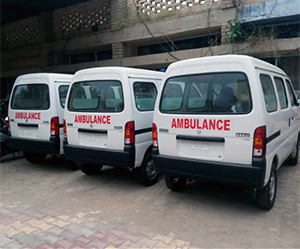Meerut, Sep 4: In yet another heart-rending incident, a woman ran from one hospital to another with her daughter's body and was forced to spend a night outside the emergency wing of the district hospital with the dead child after ambulance drivers allegedly refused to take them to their village as it was in another district.
It comes just days after the disturbing incident reflecting hospital apathy in Kanpur, where a man was allegedly made to take his ailing son on his shoulders from one department to another by the doctors and the child finally died.
Two-and-a-half-year-old Gulnad, a resident of Baghpat district, was suffering from a viral infection and undergoing treatment at P L Sharma government hospital but on Thursday night, her condition deteriorated and doctors referred her to Lala Lajpat Rai Medical College (LLRMC) Hospital here.
Her mother Imrana took her to the LLRMC hospital where doctors declared her brought dead.
Imrana alleged that for two hours she pleaded with the hospital ambulance driver to take the body to her village Gauripur but he refused, saying he is not allowed to travel to other districts.
Expecting help from district hospital authorities, Imrana took the body to the district hospital in a private ambulance after paying Rs 200 but there also she was denied ambulance service.
Imrana claimed that she requested the doctors at the hospital for hours to get ambulance service and when she contacted the hospital ambulance driver, he refused to go to her village stating that it is in another district while private ambulances demanded Rs 2,500 for the journey which she did not have.
According to Imrana, she, with her daughter's body on her lap, spent the night outside the emergency wing of the hospital.
The next morning, some people present there chipped in and hired a private ambulance to take the body to her village.
Meanwhile, District Magistrate, Meerut, Jagatraj Tripathi said, "This incident has not come to my notice yet. But I will order an investigation into it.
"Whoever is found guilty will be punished. I'll ask the chief medical officer, the additional director that these type of incidents should not happen," he added.
In similar shocking incidents in Odisha, a man was forced to carry his dead wife on shoulder after being denied a hearse by the hospital authorities while another had to walk miles carrying his seven-year-old daughter's body as the ambulance transporting them allegedly left them midway.





Comments
Thank you Minister UT Khader for doing enormous amount of work and selfless services rendered to downtrodden people around while you were health minister.....you always upheld the humanity first...keep doing great job....God bless....
Add new comment